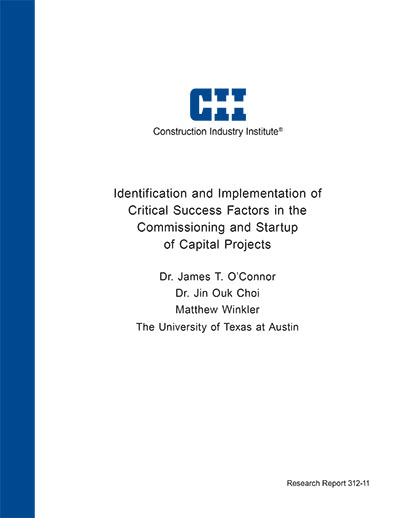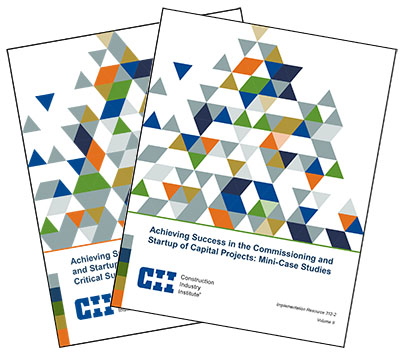
Critical Success Factors for Project Commissioning and Startup
Commissioning and startup (CSU) is the critical last phase of a capital project before the facility is placed in operation to meet commercial objectives. Unfortunately, many project teams do not effectively plan and implement the activities needed to ensure a successful CSU phase. Recognizing this significant shortcoming, the Construction Industry Institute (CII) chartered Research Team (RT) 312, Best Practices for Commissioning and Startup, to conduct a broad-reaching, data-centric study to determine critical activities for CSU success. After soliciting input from professional experts and collecting and analyzing objective data, the research team first identified 139 potential factors affecting CSU. Next, the team refined this list of potential factors down to 16 critical success factors (CSFs), characterizing them by their specific required actions and positions within the project phase sequence, and firmly demonstrating the need for generally earlier planning of CSU.
The research team also developed a set of unique indicators of CSF achievement to serve as “tell-tales” of whether CSFs have been implemented effectively. Utilizing these tell-tales, the team collected real project CSF implementation data and CSU performance data from 26 capital projects. The analysis of this data convincingly validated the principles and recommended timing of the CSFs. The team conducted additional analysis to determine why certain CSFs are less frequently implemented, and found that project teams should apply particular effort on these “laggard” CSFs.
The research team also showed how the CSFs complement, or can be integrated with, the steps of the CII Planning for Startup best practice model (described in CII Implementation Resource (IR) 121-2). In addition, the team identified five technologies that add value to the efforts of CSU teams and project stakeholders. The final RT 312 product was the user-friendly CSU Critical Success Factor Implementation Checklist, a tool for developing project execution and CSU plans, and for managing CSU efforts all the way through to project completion. The checklist is part of IR 312-2, Achieving Success in the Commissioning and Startup of Capital Projects, a two-volume publication offering implementation guidance and case study summaries.
Commissioning and startup success largely determines whether a project is ultimately successful. Thus, the value proposition for rigorous, thorough CSU planning cannot be overstated. Use of the 16 critical success factors identified in this research, along with other research team findings, will help project teams ensure the achievement of full project value.
The research identified 16 CSFs for commissioning and startup focused at a high level on: (RS312-1)
- Leadership
- Team Alignment
- Integration
- Collaboration
- Capability
- Success criteria
- Interface management
- Recognition of value drivers
- Planning
- Funding for planning
- CSU systems-focus
- Support tools
- Information
{^widget|(widget_displayname)WatermarkImage|(name)WatermarkImage|(image)%7e%2fCII%2fmedia%2fPublications%2f312_1Table2-1.PNG%3fext%3d.png|(width)|(height)^}
{^widget|(widget_displayname)WatermarkImage|(name)WatermarkImage|(image)%7e%2fCII%2fmedia%2fPublications%2f312_1Table2-2.PNG%3fext%3d.png|(width)|(height)^}
{^widget|(widget_displayname)WatermarkImage|(name)WatermarkImage|(image)%7e%2fCII%2fmedia%2fPublications%2f312_1Table2-3.PNG%3fext%3d.png|(width)|(height)^}
{^widget|(widget_displayname)WatermarkImage|(name)WatermarkImage|(image)%7e%2fCII%2fmedia%2fPublications%2f312_1Table2-4.PNG%3fext%3d.png|(width)|(height)^}
Management should focus on implementing and assessing CSF achievement. The research identified 45 indicators across the 16 CSFs, which could provide evidence of CSF achievement. (RS312-1, p. 16)



